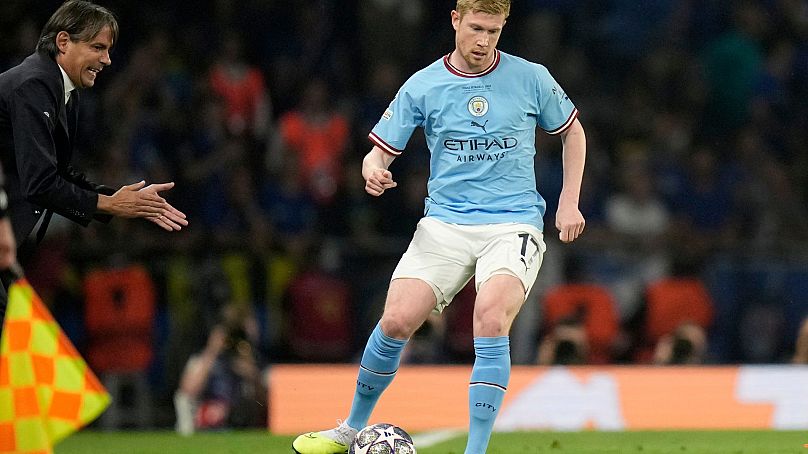Environmental campaigners are urging football teams to ‘break up’ with polluting airline sponsors.
UEFA (the Union of European Football Associations) has come under fire fromby green activists for profiting off airline sponsorships.
 ADVERTISEMENT
ADVERTISEMENT
 ADVERTISEMENT
ADVERTISEMENT
The Champions League returned this week “awash with climate-wrecking airline sponsors”, tweeted campaign group Fossil Free Football.
This Valentine’s Day, it’s calling on the football association to “break up” with these polluting partners.
UEFA is sponsored by Turkish Airlines, while five of the 16 Champions League final teams will play with an airline sponsor on their shirts.
These sponsorship deals have a combined annual value of over €317 million and an overall value of at least €917 million, according to calculations from SportBusiness Sponsorship Database 2024.
“Europe has been devastated by soaring temperatures, raging wildfires and deadly floods yet the continent’s premier football club competition still acts as a giant billboard for climate-wrecking airlines,” says Michael Hardy from the Game Changer Sponsorship Pledge, which encourages fans, athletes and clubs to help end polluting sponsorships.
Which football teams are sponsored by airlines?
Seven teams playing in the Champions League feature airline sponsors on their shirts, five of which have made it through to the latest round.
This includes Arsenal and Real Madrid, both sponsored by Emirates, and Manchester City which is sponsored by the UAE’s other flag carrier Etihad. As well as displaying the airlines’ logos on their shirts, Arsenal and Man City also have stadium sponsorship deals with them.
Atlético Madrid sports Saudi Arabia’s Riyadh Air logo on its shirts, while Paris Saint-Germain and Inter Milan are sponsored by Qatar Airways.
Many other clubs have smaller deals with airline sponsors, including Borussia Dortmund with Eurowings, Lazio with Aeroitalia, and PSV with Eindhoven Airport and Corendon Airlines.
“Elite football continues to promote and normalise [air travel] as if the planet wasn’t heating,” says Freddie Daley of the Cool Down Sport For Climate Action Network, who is campaigning alongside Fossil Free Football.
“Football could be a powerful partner in the energy transition, but to do that, it must stop aligning with companies that are undermining the future of the game.”
Are the football industry's sustainability pledges what they seem?
Football teams have been trying to improve their environmental image in recent years. UEFA has committed to the UN Sports for Climate Action Framework, which aims to “promote sustainable and responsible consumption” and halve emissions by 2030 compared to pre-pandemic levels.
French footballer Paul Pogba has teamed up with Adidas to launch vegan football boots. And teams from the UK’s Millwall to FC Nantes in France have chosen trains over domestic flights to travel to games.
Earlier this month, annual campaign Green Football Weekend returned, promising to use the power of football to tackle climate change through environmental initiatives among clubs and fans.
But eco-activists argue that this is at odds with the way teams are operating.
Concerns have been raised over the sharp increase in flights under UEFA’s recently announced new fixture schedule. While the union has encouraged teams to take a bus or train to this summer’s Euro 2024, it has dropped its initial flight-free requirement for a looser “common sense” approach.
“Fixtures could be organised in a way that would enable teams to travel more sustainably, while high-carbon advertising encouraging fans to follow those teams by flying needs to be banned,” says Rob Bryher, aviation campaigner for climate charity Possible.
UEFA is encouraging fans to travel to the summer games by rail by offering many ticket holders discounted train tickets and public transport passes.
Emissions from flights are growing fast
Emissions from flying are growing faster than any other mode of transport, according to the European Federation for Transport and Environment. They more than doubled from 1.5 per cent of all European emissions in 1990 to 4.7 per cent in 2019.
This trajectory is expected to continue in 2024 as the travel industry fully bounces back from the pandemic. If action is not taken, aviation emissions could double again by 2050, consuming more than 10 per cent of the world’s remaining carbon budget to keep global warming below 1.5°C, Transport and Environment warns.
Fossil Free Football argues that polluting airline ads should be shunned from football in the same way that smoking ads were. It also advocates for making the football calendar smaller and more regional to reduce emissions from flying and make games more accessible for fans.
Euronews Green has contacted UEFA for comment.











